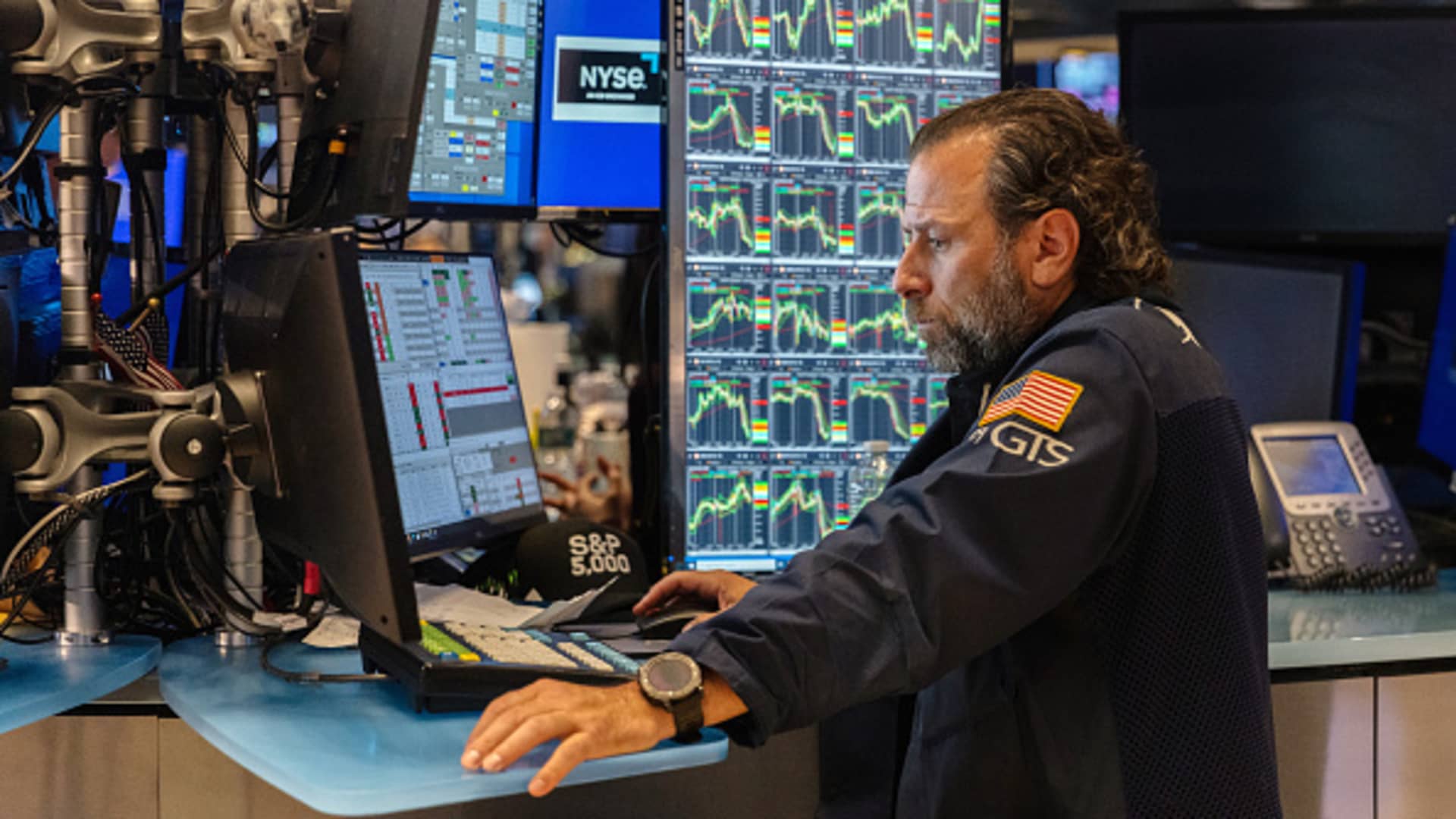A trader works on the floor of the New York Stock Exchange (NYSE) on August 1, 2024 in New York City. New economic data showed initial jobless claims rose the highest in a year and a manufacturing index that measures factory activity in the U.S. came in worse than expected, causing renewed worries of a recession and a broad sell off in stocks.
Jeenah Moon | Getty Images News | Getty Images
Strategists on Friday urged investors to take a cautious approach to a global stock market sell-off, warning it may be too early to buy the dip given that shares “look vulnerable to further falls.”
U.S. stocks kicked off August sharply lower as fresh data prompted fears of a worsening economic outlook.
Initial jobless claims rose the most since August 2023. The ISM manufacturing index, a barometer of factory activity in the U.S., came in at 46.8%, worse than expected and a signal of economic contraction.
The weak data led investors to worry the Federal Reserve may be behind the curve in cutting interest rates to fend off a recession.
European stocks fell around 1.6% on Friday morning, tracking a slide on Wall Street. In Asia, Japan’s benchmark indexes tumbled more than 5% on Friday, with the Nikkei index notching its worst day in over four years, Reuters reported.
Cedric Chehab, global head of country risk at research firm BMI, said a combination of factors were at play amid souring market sentiment. However, he insisted “corrections like this are absolutely normal.”
“The sell-off started about a week and a half ago but then it started to escalate down lower in the middle of this week. That was triggered by several things,” Chehab told CNBC’s “Street Signs Asia” on Friday.
“First of all, the hawkish Bank of Japan caused an implosion of the carry trade over a short-term basis. We also had bad manufacturing data out of the U.S. and some employment sub-indicators which scared markets,” he continued.
“And then overnight, we saw a lot of volatility in some of the major earnings. And all of that helps push equity markets, which had been quite expensive, even lower.”


Chehab said one factor that some investors appeared to be forgetting was that there is typically a seasonal rise in equity market volatility between the period of July and October.
“So, this isn’t to be completely unexpected given the historical patterns around calendar effects on equity markets, especially after the fact that there was such a large rally in U.S. stocks and global stocks.”
Asked whether the sell-off means investors should be thinking about hitting the panic button, Chehab replied, “No, I don’t think so. And that’s because from a technical perspective there is a lot of support, in terms of moving averages and key technical levels.”
He added, “corrections like this are absolutely normal, particularly when you have momentum which is overdone on the upside.”
Too early to buy the dip?
Policymakers at the U.S. central bank on Wednesday held interest rates steady, although Fed Chair Jerome Powell gave investors some hope by signaling a September rate cut is on the table.
Federal Reserve Chairman Jerome Powell takes a question from a reporter during a news conference following a Federal Open Market Committee meeting at the William McChesney Martin Jr. Federal Reserve Board Building on July 31, 2024 in Washington, DC.
Andrew Harnik | Getty Images
Shane Oliver, head of investment strategy and chief economist at investment management firm AMP, said a correction appears to be getting underway.
“Shares went sky-high into July on the back of better news on inflation, increasing optimism about lower interest rates ahead and optimism about IT and AI related earnings,” Oliver said in a research note published Friday.
He added that while AMP’s view is that lower interest rates ahead will likely boost shares over the next six to 12 months, assuming a recession is avoided, global shares “look vulnerable to further falls suggesting that it’s too early to buy the dip just yet.”
Market attention now turns to the closely watched nonfarm payrolls report later on Friday, with investors looking for clues on the pace and scale of Fed cuts over the coming months.
— CNBC’s Pia Singh & Samantha Subin contributed to this report.















